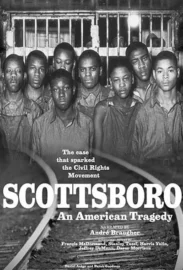Enjoy a free preview via Film Discovery! Click here !
Enjoy a free preview via Film Discovery! Click here !
Enjoy a free preview via Film Discovery! Click here !
Enjoy a free preview via Film Discovery! Click here !

https://www.filmplatform.net/product/scottsboro-american-tragedy
Powerful Oscar nominated documentary about when fate places people in the wrong place at the wrong time and when fear and suspicion fuel injustice. The once-famous case of the nine Scottsboro Boys is the tale of such a dramatic miscarriage of justice that started in the early 1930s: nine poor young black men, charges of white rape, a fancy New York Jewish defense lawyer, an all-white Alabama jury, sentences of death culminating in a dogged international (Communist inspired) campaign to free the “Scottsboro Boys”.

Co-Director Barak Goodman discusses his own fascination with the Scottsboro
Case and its impact on the civil rights movement.
BBC Four: What drew you to the Scottsboro Case as a subject for a film?
Barak Goodman: This is the great American subject and I’ve always been
interested in race and the treatment of black Americans. I knew very little
about Scottsboro until I read a fantastic book called Stories of Scottsboro
by James Goodman which tells the story from many points of view so you
really got a filled-out picture. I believed it would make a perfect film and
went to Jim and asked if he’d like to cooperate. He was very enthusiastic
and the film is very loosely based on his book.
BBC Four: What did you find particularly filmic about the story that added
to the book?
BG: Jim is concerned mostly with historical questions. I became very
interested in the characters – the human drama of these nine young men and
their mothers dealing with this juggernaut. And I was especially interested
in the relationship between the Jewish lawyer and these southern black boys
– his commitment to the case and how he changed from when he first took the
case to when it ended.
BBC Four: When he’s first introduced in the film he seems the least likely
person to help these boys…
BG: He was a fairly vain, showboating lawyer for many years. He was
associated with criminals and gangsters and not such high-minded causes as
this. But I think underlying that he was very much committed to justice. I
think a lot of Jewish-Americans had that imbued in them. He quickly became
intersted in things other than money and fame. He became completely
committed to proving a case that he believed passionately in and was unable
to prove in an Alabama courtroom. They simply would not hear and that became
something that just would not sit right with him. He just would not let go.
BBC Four: Were the people in Alabama at all reluctant to talk about the
case?
BG: Everybody in this part of Alabama knows about the case but they know it
second-hand and we weren’t interested in hearing second-hand accounts. It
was quite a search to find people alive who knew anything about it. But once
we found those people there was a real range. Some completely refused to
speak to us, in fact closed doors on us. Others were the opposite. They were
eager to talk to us because they felt that the real story hasn’t been told.
They felt that this part of Alabama had been unfairly stigmatised.
BBC Four: The American Communist Party features quite heavily in the story.
This must be one of the last times that they had a major impact in US
history…
BG: That’s probably true. Obviously the Communist Party declined
precipitously after it was revealed what Stalin was doing. We have been
criticised by ex-Communists as being too hard on the party in this film –
judging them to be too opportunistic. That might be true of the
rank-and-file members but I think the leadership really was seeking to use
this case and turn it into propaganda for the party. But I do think the role
of the Communist Party has been greatly underestimated. They were the first
on the scene in many of these horrible injustices.
BBC Four: How do see the Scottsboro Case in relation to the civil rights
movement events that most people are familiar with in the 1950s and 60s?
BG: You can’t start the history of civil rights in the 50s and 60s – it has
much deeper roots than that. What we tried to say is that this is the
beginning of the integrationist civil rights movement, which was the key to
achieving civil rights in the United States. It would have been impossible
had it remained a solely black issue. And that is largely due to the
Communist Party’s intervention in this. Their rank-and-file members could
turn out crowds of tens of thousands of people in the urban centres of
America and all over the world. In fact they did that. These people, mostly
white, really set the stage. And many other civil rights leaders had their
minds and point of views shaped by this very spectacular incident. I think
it’s really the beginning and needs to be recognised as such.